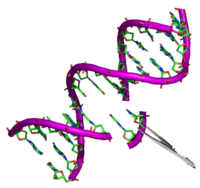
Photo from wikipedia
Abstract Despite the prohibition of the importation, production, distribution, marketing and use of genetically modified (GM) plants in Algeria, no legislation regarding their use in food and feed production has… Click to show full abstract
Abstract Despite the prohibition of the importation, production, distribution, marketing and use of genetically modified (GM) plants in Algeria, no legislation regarding their use in food and feed production has been established. The present work describes, for the first time, a full-stage study to monitor genetically modified organisms (GMO) in Algeria, based on a comprehensive survey of maize-derived foods, providing screening, event-specific identification and quantitative data targeting 11 maize events (Bt176, Bt11, MON810, GA21, NK603, MON863, TC1507, MIR604, DAS59122, 3272 and DAS40278). The results show that, out of 91 maize-derived samples positive for an endogenous maize gene, 20% contained at least one screening GM element. Six events were identified in 16 samples, being MON810, NK603 and TC1507 the most frequent (16%, 15% and 14% of the samples, respectively), followed by GA21, Bt11 and DAS59122 (7.6%, 6.6% and 2.2%, respectively). Interestingly, out of those samples, 14 had 3–5 GM events, while only 2 had one or 2 events. The quantitative real-time PCR results show very high levels of GM maize events in all samples resultant from the multiple-event accounting (34.9–222.7%), suggesting the presence of stacked events, together with single-trait ones. These findings highlight the need for specific labelling legislation regarding the GMO presence in food and the verification of its compliance.
Journal Title: Food Control
Year Published: 2020
Link to full text (if available)
Share on Social Media: Sign Up to like & get
recommendations!